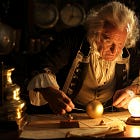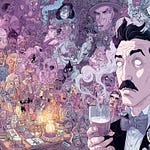I am experimenting again with a video this Sunday morning. (Podcast listeners can still get just the audio). Enjoy :)
It was August 2018. Brexit Derangement Syndrome was only just starting to kick in, though the effort to derail it was underway. In comedy circles, I still was not talking very openly about having voted for Brexit—it would be another six months before I wrote 17 Million F Offs.
I was doing a show at the Edinburgh Fringe, my financial gameshow.
Now something happens to a performer at the Fringe. There are so many shows and so much competition that you will do (almost) anything to get publicity and draw attention to your show. The Fringe is a distillation of the entertainment industry; all the best things about it and the worst, all the highs and lows, seem to get magnified there. My PR man texted me and asked if I wanted to do a short spot about Brexit and comedy for Channel 4 News. I said yes. He said to go to the Pleasance at 5pm. They wanted someone who voted Leave.
I met the film crew there, and the presenter— I have no idea what his name was—was a very nice, very charming young Englishman in his early 30s. University-educated, probably public school, made me feel very at ease. We found a little alcove, and our interview began.
“In a comedy club, what do you say when heckled about Brexit?” he asked me.
Now there are three types of comedy gigs. One is where the audience has come to see you; two is when they have come to see comedy (not necessarily you); and three, the worst type of gig, is when they neither come to see you nor comedy.
Comedy clubs mostly come under category two (unless you are doing a solo show).
I answered the question truthfully: “I MC a lot of nights. My job is to create a warm and friendly atmosphere. Audiences in comedy clubs are fairly mixed. So, I tend to avoid talking about Brexit, as you risk losing half the room, which is not good for the night.”
“Sure, but what would you say if someone heckled you about Brexit?”
“Well, I don’t talk about it, so they don’t.”
“But if you did?”
“But I don’t.”
This went round in circles for a bit. Then he changed his approach. “And if someone heckled you about voting Leave?”
“Well, they don’t because I don’t talk about it.”
“No, but what if they did?”
“Well, they don’t. As I say, in a regular comedy club, with a mixed crowd, if you come down very heavily on one side, you risk losing half the room. I’m the host. I don’t like to do that. It might be different if I was doing a show specifically about it, but I’m not.”
“Well, what if you were?”
“Well, I’m not. And if I was doing a show about voting leave, I doubt many remainers would come.”
“But what if they did?”
It just kept going round and round in circles. I thought I was being reasonably articulate about the need to be diplomatic in a mixed room if you are the host, and I made the same point several times, each time phrasing it slightly differently, but he just was not having it. He kept coming back to this same question.
“But if someone heckled you about voting Leave, what would you say?”
Eventually, somewhat exasperated, I said, “Oh, I don’t know. ‘Whatever, loser.’ Something like that.”
He smiled and quickly drew the interview to a close. We parted company with, apparently, good will expressed. I had spent probably five minutes explaining the need to be diplomatic and a microsecond with that last line.
Later that day, I watched the clip from Channel 4 News. Guess which part of the interview they used?
“Leaver comedian calls people who voted Remain losers,” ran the headline of the vid on the Channel 4 site, or some such (I can’t find the vid now to quote it accurately).
The only clip from the interview they used was me saying, “Whatever, loser,” even though it was totally misrepresentative of the rest of the interview. Then in the comments beneath, I remember reading a load of remarks along the lines of, “Well, how is that funny?”, “Remind me to never go and see that guy,” “Leavers just aren’t funny,” and so on.
I won’t say I was shocked by how disingenuous the process was, but I was shaking my head wearily. I explained it to myself along the lines that he had gone into the interview wanting a certain clip that he could use to illustrate a story he had already formed in his head. He would not stop until he got that clip, and he had no interest in anything else I said. I suppose that’s a kind way of looking at it—a trap I often fall into. On the other hand, he was a lying cheat, and the clip he showed of me was completely misrepresentative. It could have been quite damaging to me reputationally, but fortunately, the clip was so short, and not that many people will have watched it.
If nothing else, it showed me just how untruthful the news is.
You really cannot trust it. No wonder so many have lost faith.
When you have a reporter brimming with ambition (the same ruthless ambition that actors, singers, comedians, and other media stars have), the most important thing is their career. Everything else, including the truth, is subordinate to that. Sometimes there is a happy coincidence: the reporter boosts his career by breaking some amazing truth. But given a choice between the two, career usually wins. Such is the nature of the ambition of many in the media.
Even with everything I know now, I still watch a news story and am taken in by it. It’s only when you were actually there that you see just how misrepresentative it can be.
Don’t trust the news. It lies.
I’ve now just remembered another story. It was during the 1990 World Cup when the English fans got into scuffles with Dutch fans just before the England-Holland game in Cagliari. Evil, terrible hooligans causing trouble, ran all the headlines, alongside lots of footage of Italian police with riot gear, firing off tear gas, and all the rest of it. I was there. I’m bilingual. I saw the whole thing. The Italian police directed tens of thousands of English straight into tens of thousands of Dutch in the narrow lanes of the historical centre—the police messed up badly. They then panicked and started firing off tear gas. The news told a completely different story.
I was 20 at the time. I think that was my first taste of the BS.
Thank you very much for reading this and for being a subscriber. Don’t forget:
This August I am going to the Edinburgh Fringe to do one of my “lectures with funny bits”. This one is all about the history of mining. As always, I shall be delivering it at Panmure House, where Adam Smith wrote Wealth of Nations. It’s at 2pm most afternoons. Please come. Tickets here.
My first book and many readers’ favourite, Life After the State - Why We Don’t Need Government (2013), is now back in print - with the audiobook here: Audible UK, Audible US, Apple Books. I recommend the audiobook ;)
You can catch up on all my latest pieces here.
Until next time,
Dominic
P.S. In case you missed them, check out these recent pieces:
Argentina and the Accidental Gold Standard both proved very popular.















